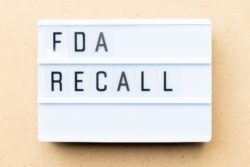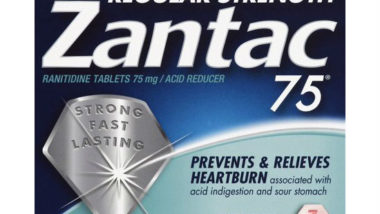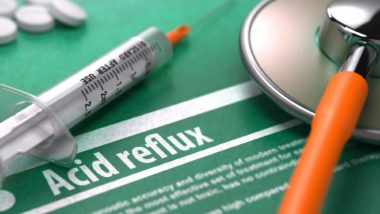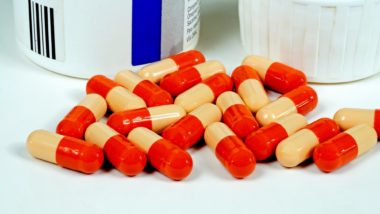Top Class Actions’s website and social media posts use affiliate links. If you make a purchase using such links, we may receive a commission, but it will not result in any additional charges to you. Please review our Affiliate Link Disclosure for more information.
Ranitidine has been recalled, including its brand-name version Zantac, following discovery of contamination with a possible carcinogen. Many people who take these medications may now be wondering: when was ranitidine recalled? Why was ranitidine recalled? Which ranitidine has been recalled? And is ranitidine safe to take?
On Sept. 13, 2019, the U.S. Food and Drug Administration announced that some batches of ranitidine contained contamination with NDMA–short for N-nitrosodimethylamine, a probable human carcinogen that is a byproduct of some manufacturing processes.
Pharmaceutical company Novartis has a generic division, Sandoz, which produces ranitidine. Sandoz and another generic manufacturer, Apotex, recalled their generic ranitidine medications in the U.S.
Brand-name Zantac is made by drugmaker Sanofi. On Oct. 18, 2019, Sanofi announced it was voluntarily recalling over-the-counter Zantac over concerns about NDMA contamination.
CVS, Walgreens and Walmart have stopped selling both brand name Zantac and generic ranitidine.
Which Ranitidine Has Been Recalled?
Which ranitidine has been recalled? The FDA has updated its information about the safety of ranitidine. Ranitidine has been recalled by a slew of companies over the last year, and the FDA requested removal of all ranitidine products from the market in early April.
The ranitidine contamination was originally announced by the FDA in September 2019. Since the announcement, voluntary recalls have been announced by several generic drug makers including Sandoz, and the manufacturers that supply ranitidine for CVS, Rite Aid, Walmart, and Walgreens.
When Was Ranitidine Recalled?
So when was ranitidine recalled? The answer varies. To date, several ranitidine products have been either recalled or removed from retailers’ shelves: The FDA has regularly updated its list of which ranitidine has been recalled.
- On Sept. 23, Sandoz (the generic arm of Novartis) announced a voluntary recall of all its ranitidine hydrochloride capsules in the United States.
- On Sept. 25, Apotex voluntarily recalled all its 75mg and 150mg ranitidine tablets nationwide.
- Sanofi initiated a recall on Oct. 18 of all its Zantac OTC (over-the-counter) in the United States.
- Perrigo issued a worldwide voluntary recall, announced on Oct. 23, 2019, of all its ranitidine products.
- Also on Oct. 23, 2019, Dr. Reddy’s announced it issued a voluntary recall of all its ranitidine products in the U.S.. Several Dr. Reddy’s products are sold under store brand names like Walgreens, Member’s Mark (Sam’s Club), CVS, Kroger, and Equate (Walmart).
- Lannett Company announced on Oct. 25, 2019 that it would recall all its ranitidine syrup (15mg/ml).
- Also on Oct. 25, Novitium Pharma announced a voluntary national recall of all 150mg and 300mg ranitidine capsules in the United States.
- Aurobindo Pharma recalled 38 lots of ranitidine tablets, capsules and syrup on Nov. 6, 2019.
- Amneal Pharmaceuticals recalled ranitidine tablets and syrup on Nov. 8 (the FDA announcement was published on Nov. 22).
- Golden State Medical Supply issued a recall on Nov. 15 of ranitidine hydrochloride capsules.
- On Nov. 19, Precision Dose issued a recall for five lots of ranitidine oral solution.
- Glenmark Pharmaceuticals issued a ranitidine 150 mg recall and 300 mg recall on Dec. 17, 2019.
- On Jan. 6, 2020, Denton Pharmaceuticals recalled its ranitidine tablets (announced by the FDA on Jan 8), including a ranitidine 150 mg recall and 300 mg recall.
- On Jan. 7, 2020, Appco Pharmaceuticals issued a recall of its ranitidine tablets.
- American Health Packaging issued a ranitidine 150 mg recall on Feb. 27, 2020.
- On April 1, 2020, the FDA requested that all ranitidine products be removed from the market.
Is Ranitidine Contaminated?
So why did ranitidine get recalled in the first place? According to testing done on ranitidine tablets, these drugs may be contaminated. The contaminant found in ranitidine is known as n-nitrosodimethylamine (NDMA). NDMA is an industrial waste product of a number of processes, including the manufacture of jet fuel, and has been classified as a probable human carcinogen. It has previously been found as a contaminant in valsartan and other ARB blocker medications. Although NDMA is found in the environment and it is impossible to eliminate all exposure to the contaminant, it may lead to adverse health consequences after long term exposure.
Ranitidine has been recalled after the FDA advised pharmaceutical companies to recall tablets if testing of the medication showed levels of NDMA above 0.32 parts per million. This has been determined to be the acceptable daily intake level of NDMA. Contaminated ranitidine has been recalled by several manufacturers due to the possible dangers associated with higher intake levels.
The FDA’s website advised drug companies to recall ranitidine products if they contain more than 96 nanograms per daily dose of NDMA. The FDA explained that 96 nanograms per day is the daily acceptable intake for NDMA. But recent research into the nature of the NDMA contamination revealed that the amount of NDMA in ranitidine may be hard to pin down. Since this initial recall advisement, the FDA has taken a stronger stance, and on April 1, 2020, requested voluntary recall for all over-the-counter ranitidine to get it off the market immediately due to the NDMA risk.
CBS News explains that a study conducted by Emery Pharma showed that NDMA may be created when the heartburn drug is heated above a certain level. Researcher Ron Najafi elaborated on this phenomenon, saying, “NDMA in this case… is not an impurity in the drug; it’s being formed from the drug itself.”
CBS says that Emery Pharma’s research showed that the drug’s NDMA content rose somewhat when the drug was kept at room temperature and rose quickly when it was exposed to higher heat. Reportedly, when ranitidine was at room temperature for 12 days, the NDMA content rose to 25 nanograms. When ranitidine was heated to 158 degrees Fahrenheit, however, the NDMA content skyrocketed to 143 nanograms — much higher than the FDA’s daily acceptable intake level of 96 nanograms per day.
Reportedly, more research is needed to fully understand the relationship between ranitidine and NDMA. For instance, researchers do not yet know if the drug needs to be kept cold to keep from converting into NDMA, or if it can still convert into NDMA once it has been ingested.
 Do I Need to Stop Taking Zantac?
Do I Need to Stop Taking Zantac?
The FDA is continuing to test generic and brand name versions of both prescription strength and over-the-counter strength ranitidine. At this time, the FDA is not recommending patients stop taking the medicine.
What Can I Take Instead of Zantac That Can Help Reduce Stomach Acid?
Tagamet (cimetidine) and Pepcid (famotidine) are two other over-the-counter medications that work similarly to Zantac to reduce the effects of stomach acid, such as acid reflux and heartburn.
What Type of Drug Is Zantac?
Zantac (ranitidine) is a histamine-2 (H2) blocker that reduces the amount of stomach acid and counteracts stomach acid’s corrosive effects that cause heartburn and acid reflux. Both Tagamet and Pepcid are H2 blockers as well.
The medication is often prescribed to patients who suffer from peptic ulcers, gastroesophageal reflux disease (GERD), and Zollinger-Ellison syndrome. Prescription versions of the drug are taken by approximately 15 million people in the United States every year, along with likely millions of others who take a low-dose over-the-counter version of the drug, like Zantac.
What Are Ranitidine Side Effects?
Like any medication, ranitidine comes with certain potential side effects. The most common of ranitidine side effects include:
- Headache
- Constipation
- Diarrhea
- Nausea and vomiting
- Stomach discomfort or pain
More serious ranitidine side effects can include:
- Inflammation of your liver (symptoms include yellowing of skin or eyes, dark urine)
- Changes in your brain function (confusion, agitation, depression, hallucinations)
- Abnormal heart rate (fast heart rate, tiredness, shortness of breath)
However, these ranitidine side effects were not the cause of the recent slew of recalls, but rather the reports from the U.S. Food and Drug Administration that indicate that ranitidine may be contaminated by NDMA.
What Is NDMA?
According to the World Health Organization, NDMA is a byproduct caused by the breaking down of dimethylhydrazine, which is a component of jet fuel, as well as a byproduct of other industrial manufacturing processes. NDMA has been found in some pesticides and can be a byproduct of the chlorination of water, especially if ammonia is not removed first.
According to the U.S. Environmental Protection Agency (EPA), NMDA also may be a byproduct from tanneries, rubber and tire manufacturers, fish processing facilities and dye makers. NDMA exposure may occur by eating smoked or cured meats and fish, drinking malt beverages that may contain low levels of nitrosamines created during processing and inhaling cigarette smoke.
What Are the Dangers of Contaminated Ranitidine?
Research has indicated that NDMA exposure may result in the development of tumors and cancer. Exposure to ranitidine contaminated with NDMA may result in serious health consequences, including stomach cancer or bladder cancer. Other side effects of NDMA may include nausea, vomiting, fever, abdominal cramps, dizziness, and damage to the kidneys and lungs. Patients who take ranitidine for the treatment of heartburn may wish to talk to their primary care doctor about switching to a different medication until the source of the contamination in ranitidine tablets has been determined.
While the FDA has not said that patients should stop taking ranitidine across the board, the agency noted that people should at the very least be aware of this potential risk and talk to their doctor if they have any concerns. If someone uses an over-the-counter version of ranitidine, they may choose to switch to a different approved medication instead.
Victims who have been diagnosed with cancer after taking contaminated or recalled ranitidine may be eligible to hire a qualified attorney and file a class action lawsuit against the drug manufacturers.
What Types of Cancer Are Associated with NDMA Exposure?
According to the World Health Organization, NDMA may be associated with an increased risk of gastric or colorectal cancer. NDMA is very toxic to the liver.
Is NDMA the Same Contaminant That Was Found in Valsartan Blood Pressure Medications Earlier?
Yes, NDMA was found to have contaminated certain lots of valsartan and other blood pressure medications.
How Much NDMA Has Been Found in Zantac Compared to the Amount Found in Valsartan?
The FDA is still conducting tests, but have said the amount found is very small. At the time of the valsartan NDMA discovery, the FDA said if 8,000 patients took the maximum daily dose of valsartan for four years, there would be one additional cancer diagnosis in that group of patients.
In an issued statement, Dr. Janet Woodcock, director of the FDA’s Center for Drug Evaluation and Research, said, “Although NDMA may cause harm in large amounts, the levels the FDA is finding in ranitidine from preliminary tests barely exceed amounts you might expect to find in common foods.”
Can I File a Ranitidine Lawsuit?
If you or someone you love has suffered from stomach cancer or bladder cancer after exposure to ranitidine, you may be able to file a ranitidine recall lawsuit and pursue compensation. Of course, filing a ranitidine recall lawsuit cannot take away the pain and suffering caused by a cancer diagnosis or other NDMA complications, nor can it bring a loved one back to life, but it can at least help to alleviate the financial burden incurred by medical expenses, lost wages, and more.
Filing a ranitidine recall lawsuit can be a daunting prospect, especially in the wake of a cancer diagnosis, so Top Class Actions has laid the groundwork for you by connecting you with an experienced attorney. Consulting an attorney can help you determine if you have a claim, navigate the complexities of litigation, and maximize your potential compensation.
Join a Free Zantac Cancer Lawsuit Investigation
If you or a loved one was diagnosed with stomach cancer or bladder cancer after taking Zantac or another ranitidine medication, you may qualify to join this Zantac cancer lawsuit investigation. Learn more by filling out out the form on this page for a free case evaluation by a Zantac cancer injury lawyer.
ATTORNEY ADVERTISING
Top Class Actions is a Proud Member of the American Bar Association
LEGAL INFORMATION IS NOT LEGAL ADVICE
Top Class Actions Legal Statement
©2008 – 2024 Top Class Actions® LLC
Various Trademarks held by their respective owners
This website is not intended for viewing or usage by European Union citizens.
Get Help – It’s Free
Join a Free Zantac Cancer Lawsuit Investigation
If you qualify, an attorney will contact you to discuss the details of your potential case at no charge to you.
PLEASE NOTE: If you want to participate in this investigation, it is imperative that you reply to the law firm if they call or email you. Failing to do so may result in you not getting signed up as a client or getting you dropped as a client.
E-mail any problems with this form to:
Questions@TopClassActions.com.


 Do I Need to Stop Taking Zantac?
Do I Need to Stop Taking Zantac?










